Latest episode
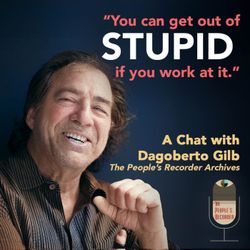
Interview with Dagoberto Gilb
19:06|Episode Summary: Today, we are sharing our never-before-released conversation with award-winning author Dagoberto Gilb. We interviewed Dagoberto for our documentary Soul of a People and were immediately impressed with his way of cutting through pretense with a single line. When we asked him if we could quote him in the outreach for the film, his reply was swift and dry: “Yes, to whatever I said, so long as I look brilliant.” That’s Dagoberto – he disarms with wit, then follows with something unvarnished and true. In our conversation, Dagoberto reminds us that literature, just like life, is at its best when it insists on being true. He isn’t interesting in polishing myths, and he has no patience for stereotypes and cliches. Instead, he’s here to tell us what’s raw, lived and true.To hear the full interview, consider joining our Patreon Community at just $5/month:www.patreon.com/PeoplesRecorderAdditional Links:Learn more about Dagoberto Gilb"A Passing West" by Dagoberto Gilb"New Testaments" by Dagoberto GilbCredits: Host: Chris HaleyDirector and Interviewer: Andrea KalinProducers: Andrea Kalin, David A. Taylor, James MirabelloEditor: Ethan OserFeaturing Music from Matt Cartonis and Pond5For additional content, visit www.peoplesrecorder.info or follow us on social media: @peoplesrecorder
More episodes
View all episodes
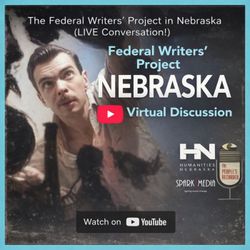
Update: Join us on February 3d for a free virtual discussion! 1:30pm EST
02:00|Join us for a special virtual discussion about the Federal Writers’ Project in Nebraska. Listen to a dynamic panel moderated by The People’s Recorder host and award-winning historian and author Chris Haley.EVENT LINKThe People’s Recorder launched in 2024 and won a 2025 Silver Signal Award for Best History Podcast. Using the 1930s Federal Writers’ Project as a lens to view our past, the podcast asks the questions: how does history get recorded and who gets to decide which history gets told? This special virtual event will build on the discussion started in the podcast, and will further explore the work and literary and cultural legacy of the Federal Writers’ Project in Nebraska.Part of the WPA, the Federal Writers’ Project provided work for unemployed writers, editors, and other white-collar workers during the height of the Great Depression. The Writers’ Project had a mandate to produce state and city travel guides, and interview everyday citizens. It was perhaps the largest and most chaotic publishing venture in American history, and yet it produced over 200 publications, and its flagship travel guide series remains important for its firsthand views of life in America. The Nebraska guide was a notable success and state bestseller. This moderated discussion will focus on the work of the Nebraska Writers’ Project and how that speaks to Nebraskans today. That includes the experiences of Rudolph Umland, a hardscrabble farmer turned editor, Weldon Kees, a hardware businessman’s son turned poet, and Ruby Wilson, a nurse who found a passion for recording first person history. We’ll also shine a light on acclaimed author of the Plains Mari Sandoz and University of Nebraska-Lincoln professor and founder of Prairie Schooner, Lowry Wimberly, whose influence was critical to the Project’s success. This special event is produced with support from Humanities Nebraska in partnership with Prairie Schooner and Lincoln City Libraries.Learn more at https://www.peoplesrecorder.info/humanities-neADDITIONAL LINKS:Event Link - February 3rd at 1:30 pm EST/12:30 pm CSTEvent Landing PageThe People's Recorder Episode 10: A Creative IncubatorHumanities NebraskaPrairie Schooner Lincoln City Libraries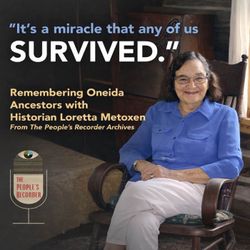
Interview with Loretta Metoxen
17:28|Episode Summary:One of our favorite episodes to work on was “Episode 6: Native Historians do Stand-up” about the WPA project to preserve the Oneida language and history. But that was not the first time we explored this story. We first traveled to Oneida, conducting interviews and digging into archives, when we produced our documentary Soul of a People. One of those interviews was with the remarkable Loretta Metoxen. Until her death in 2021, Metoxen was the Tribal Historian for the Oneida Nation, a position she served in for over two decades. She was tasked with preserving, documenting and interpreting her people’s history, culture, and traditions. Having learned directly from the WPA’s Oscar Archiquette, Metoxen is clear in her reflections on the groundbreaking work of the Oneida writers during the Depression and its huge impact today. To hear the full interview, consider joining our Patreon Community at www.patreon.com/PeoplesRecorderAdditional Links: Learn more about Loretta MetoxenOneida Nation Cultural Heritage WebsiteOneida Books RediscoveredCredits: Director: Andrea KalinInterviewer: Oliver LukacsProducers: Andrea Kalin, David A. Taylor, James MirabelloInterview Re-record and Editor: Ethan OserFeaturing Music from the Oneida Singers and Pond5 For additional content, visit www.peoplesrecorder.info or follow us on social media: @peoplesrecorder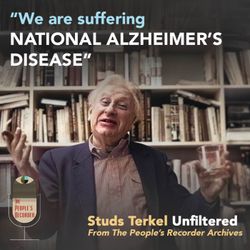
Interview with Studs Terkel
13:57|Episode Summary: Studs Terkel was many things – a Pulitzer Prize-winning author, oral historian, radio legend, fiery populist, labor advocate and, above all, a master listener. For 45 years, his Chicago radio show invited everyday people to share their stories – the kind of history that often gets forgotten. In 2006, we turned the tables and asked Studs to tell us his story. This never-before-released interview was one of his last before his death at age 96. Before we left, he signed our copy of his book about the Depression, Hard Times, with a simple message: “Keep up the good work.” And that’s what we’re trying to do with The People’s Recorder – carry forward Studs’ legacy of person-first storytelling. To hear the full interview, consider joining our Patreon Community at www.patreon.com/PeoplesRecorderFor just $5/month, you can have access to extended interviews, plus upcoming bonus episodes and AMA events. Support us on Patreon and keep these stories coming. Additional Links: Learn more about Studs Terkel Studs Terkel Radio Archives"Working" by Studs Terkel Credits: Host: Chris HaleyDirector and Interviewer: Andrea KalinProducers: Andrea Kalin, David A. Taylor, James MirabelloEditor: Ethan OserFeaturing Music from Pond5For additional content, visit www.peoplesrecorder.info or follow us on social media: @peoplesrecorder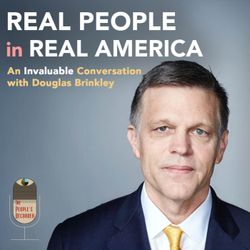
Interview with Douglas Brinkley
19:17|Episode Summary:In 2006, award-winning filmmaker and producer Andrea Kalin sat down for an interview with bestselling author and renowned presidential historian Douglas Brinkley. Together, they discussed the social and political landscape of 1930s America, the Great Depression, and how the New Deal employed writers to document that unique moment in U.S. history. Now, for the first time ever, that insightful and inspiring conversation is available for you to enjoy. To hear the full interview, consider joining our Patreon Community at www.patreon.com/c/PeoplesRecorder.For just $5/month, you can have access to extended interviews, exclusive bonus episodes and Ask Me Anything events. Support us on Patreon and help keep these stories coming. Credits: Director and Interviewer: Andrea Kalin Producers: Andrea Kalin, David A. Taylor, James Mirabello Editor: Ethan Oser Featuring Music from Pond5 For additional content, visit www.peoplesrecorder.info or follow us on social media: @peoplesrecorder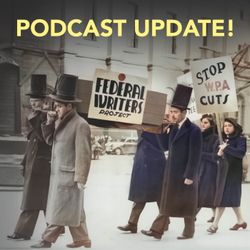
Important Update!
09:10|Episode Summary:Tune in for an important update on The People's Recorder!Host Chris Haley shares the state of the podcast now in the wake of recent funding cuts and also the exciting plans we have coming up over the next few months, including a sneak preview of "Gospel of Fear," our trilogy of episodes about Congressman Martin Dies, the playbook he used to attack the WPA and the Federal Writers' Project, and how we're all still feeling the impact of that playbook today.The People's Recorder is also now on Patreon! Support the podcast and help keep these stories coming and out in the world where they belong. Become a patron for only $5/month and receive access to exclusive interviews, bonus episodes, AMA events, and more!For more information and to sign up, visit: www.patreon.com/peoplesrecorderImage Description and Credit: Protestors in Center City Philadelphia, 1939, staging a symbolic "funeral" for the Federal Writers' Project, a Works Progress Administration program soon to be gutted by federal budget cuts. From the Historical Society of Pennsylvania.Episode Credits: Director: Andrea KalinProducers: Andrea Kalin, David A. Taylor, James MirabelloEditor: Ethan OserFeaturing Music from Pond5For additional content, visit www.peoplesrecorder.info or follow us on social media: @peoplesrecorder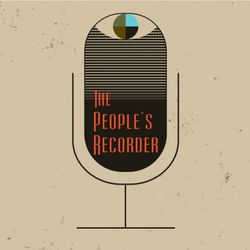
Bonus Content - Pictures of Belonging
07:42|Episodes Summary: A beautiful and powerful art exhibition is touring the country right now, called Pictures of Belonging, which explores three artists of Japanese descent - Miki Hayakawa, Hisako Hibi and Miné Okubo. The exhibition puts these artists and their work in their rightful place in the history of American art. For this bonus episode, producer and lead writer David Taylor visits the exhibition at the Smithsonian American Art Museum and shares his insights about Miné Okubo, who was featured in Episode 9: Is This Land Your Land? She was a painter who was working with Diego Rivera on murals for the WPA when she was detained and sent to an incarceration camp during World War 2. She used her artwork to bear witness to the mass incarceration of Japanese Americans during the war. Links and Resources:Pictures of Belonging: Japanese American National MuseumPictures of Belonging: Smithsonian American Art MuseumCitizen 13660 - a short film from the National Park ServiceSincerely, Miné Okubo - a short biography from the Japanese American National MuseumFurther Reading: Citizen 13360 by Miné OkuboMiné Okubo: Following Her Own Road by Greg Robinson Peaceful Painter: Memoirs of an Issei Woman Artist by Hisako HibiThe Other American Moderns: Matsura, Ishigaki, Nora, Hayakawa by ShiPu WangCredits: Director: Andrea KalinProducers: Andrea Kalin, David A. Taylor, James MirabelloEditor: Amy YoungFeaturing music from Pond5Produced with support from the National Endowment for the Humanities, Florida Humanities, Virginia Humanities, Wisconsin Humanities, California Humanities and Humanities Nebraska. For additional content, visit peoplesrecorder.info or follow us on social media: @peoplesrecorder